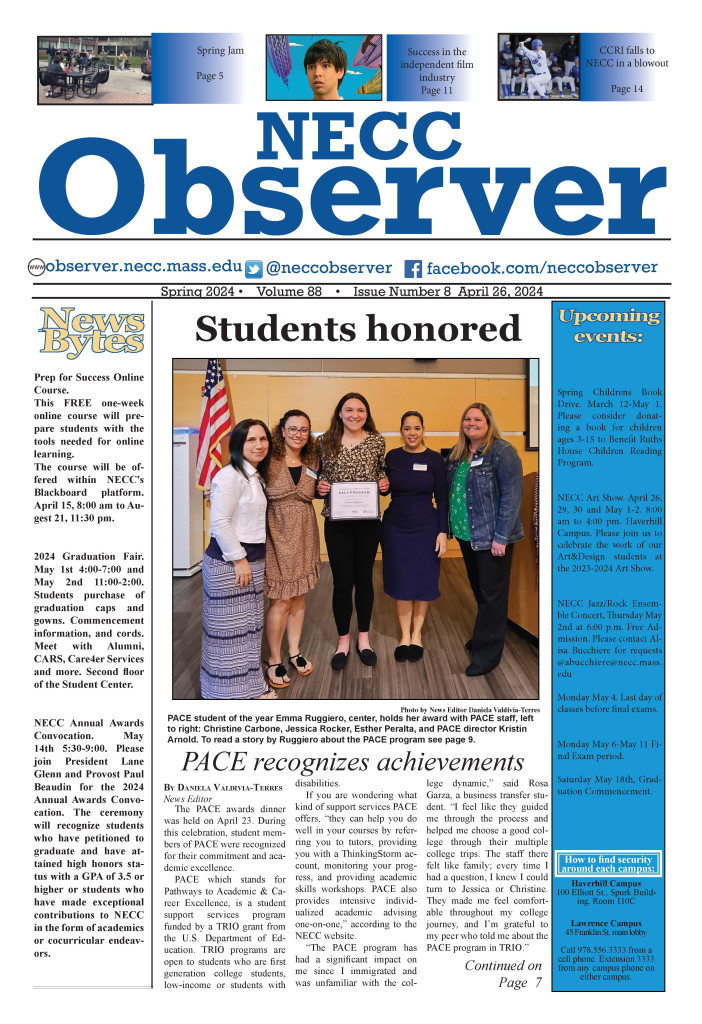At Northern Essex Community College, journalism students have the chance to have their class stories featured in Northern Essex Community College’s own newspaper, The NECC Observer.
About every two weeks, Journalism students are asked to write a story about something happening at NECC.
If they are lucky, talented, and write a newsworthy story, they have the chance to get a feature.
The Observer is advised by Mary Jo Shafer, as she is also the instructor of the Journalism course. As she said over email The Observer is a student-run paper. This means that the students are the ones putting in the work,deciding what gets published, and are even writing stories for their own sections. This is something that makes The Observer such a special paper.
When asked through email what her role at The Observer is as Faculty Adviser, Shafer told me she mainly just advises, as it is a student run paper, but she does other jobs such as sending in stories to the editor-in-chief.
However, being that she is the instructor, she plays a large role in selecting the stories that are going to be published in The Observer. Her first step is reading through all of the stories that have been submitted to her. She then decides whichstories she will share with the student staff over at the Observer. “Ideally these would be the stories that are stronger candidates — well-written, newsworthy, accurate, with good quotes and sources. However, because there is a wide range of experience with journalism students, sometimes I do share stories that need help or editing,” she said over email. She then sends the stories out to the different editors, depending on what the editor is in charge of and what the story is about.
After this, it is up to the staff who get to decide which stories make it in.
However, things have changed since COVID happened. Before, with only 12-24 pages in the paper, less students were getting published. There just wasn’t enough room. But now with The Observer having an online platform, more and more students are getting the opportunity
Shafer said her biggest goal with The Observer is to be asstudent centered as possible. For her, this means students would choose and post all stories for the print edition.
Journalism student Cassidy Smith has become very fond of this program.
As she said in an interview, “I have always loved journalistic writing. Being able to have my work published in The Observer has really made me feel like a real journalist. Although I’m not sure if it’s what I want to be when I grow up, it does give me insight to what it is truly like. I think this is an amazing addition to the class.”
Smith says this gives her the real life experience she loves to see in class. To her, this makes the journalism class one of the best ones to take. Writing her stories, she feels like it is more a job than an assignment.
This year, the editor-in chief at The Observer is Jose Rodriguez, who also happens to be the sports editor.
This means that he goes to the sports games, home and on the road, writing what happens during the game as well as interviewing the athletes and coaches pre and post game.
He gets these stories into the paper by collecting the highlights of the games along with the quotes and putting them together into a story.
After he triple checks everything, the stories are ready to go.
Rodriguez said in an email that he chooses the stories of journalism students, after being sent them, by seeing if they are newsworthy and interesting. “We want stories that are worthy for NECC students like an event that is happening that could bring more audience to the event or even if it is something that happened in NECC recently that student didn’t make it and wanted to go.”
There are fewer stories in the print version of the paper, the best ones make it, but there are also many spaces in the online version if not.
So, if you are a journalism student writing newsworthy stories, you have the opportunity to get published.
If you have any interest in joining The Observer team, email Shafer at
mshafer@necc.mass.edu.
“It really is a great hands-on experience for those interested in journalism and they will be able to get clips/be published and learn valuable skills such as InDesign software, editing and website posting,
she said in an email.

